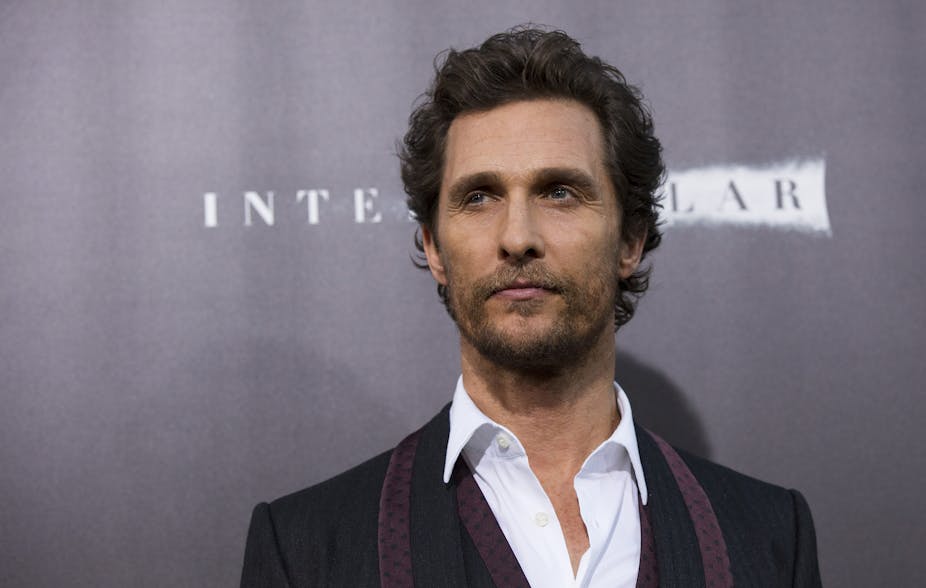At about the midway point of Interstellar, a spacecraft descends into the atmosphere of a pristine white planet. Gliding downwards, the tip of the craft brushes against a cloud, and the cloud shatters in a shower of crystal. It’s a startlingly beautiful image – worthy of Kubrick, even – and it stole the breath of the audience at the IMAX screening I attended.
Then: “Ice cloud!” announces one of the astronauts piloting the craft, witlessly and unnecessarily.
So here we have the paradox of a Christopher Nolan movie. It’s astonishing yet occasionally plodding, far too long but well worth the time. Nolan’s recurring themes – the power of ideas, the negotiable nature of reality – are present and better realized than ever before. But so are his big vices: an apparent reluctance to submit to any form of pruning, and a habit of telling instead of showing, which produces some wretchedly clunky dialogue in this otherwise must-see, near-great movie.
In the drab future of the opening act, we see that the Earth has become a giant dust bowl, and humanity is reliving the Great Depression-era of subsistence farming and narrowed horizons. “The blight,” an agricultural pestilence, is ruining the planet’s crops, and the population has put aside dreams of the stars in favor of a desperate effort to grow enough food to survive. Nolan delivers a sly comment on our contemporary reluctance to fund off-world exploration: his opening shot is of a model Space Shuttle on a bookshelf, half buried by the dust that’s fouling the planet.
Matthew McConaughey’s retired test pilot Cooper is a man out of time, his thirst to explore unquenched by the drudgery of squeezing the last life out of the Earth’s soil. Cooper’s young daughter Murph is his soulmate, and their connection is the movie’s emotional center. Their relationship, one of loss and bitter recrimination, is heartbreaking.
Murph and Cooper together figure out the strange – even supernatural – clues that point toward a secret last mission to leave Earth in search of a new home. It’s clear that Cooper, an excellent pilot, has to go, and that as a consequence he will miss most of his daughter’s life. Murph’s pleading insistence that she has read the clues again, and they say her father must stay with her, looms over what follows. The search for a new home will be dangerous.
“It’s not like looking for a new condo,” says Anne Hathaway’s scientist Amelia Brand.
Interstellar is Cooper’s story, and McConaughey is in almost every scene. He carries the load director Christopher and co-writer Jonathan Nolan give him – everyman farmer, laconic space hero, grieving father – with the intense, slightly off-kilter energy that has characterized his recent career. His performance viewing a video screen of stored messages from his children is deeply moving: his expectant face strains as he hopes for some words, anything, from his estranged daughter. The screen stays dark, and McConaughey crumbles at the realization that she has nothing to say to him.
A director with a more disciplined approach would have cut an hour from the movie. Like Nolan’s The Dark Knight Rises, there seemed to be a natural end point at least five minutes before we reach the credits. One – not two – Obelisk-shaped robots (literal chatter-boxes that flirt with the specter of Jar-Jar Binks) would have been enough. And I wish Nolan had left out a lengthy, horribly misjudged speech about love.
But to complain about Nolan’s profligacy at this point is like opening an Anthony Trollope novel and being disappointed at not finding the terse prose of Hemingway. Better to luxuriate in the abundance of Interstellar.
Many artists spend their career telling the same story again and again in slightly different ways, trying to perfect it. Nolan comes closer here than he has before, adding the crucial element of authentic emotion and helped by a wonderful leading performance from McConaughey. For all its flaws, Interstellar is a landmark movie.

